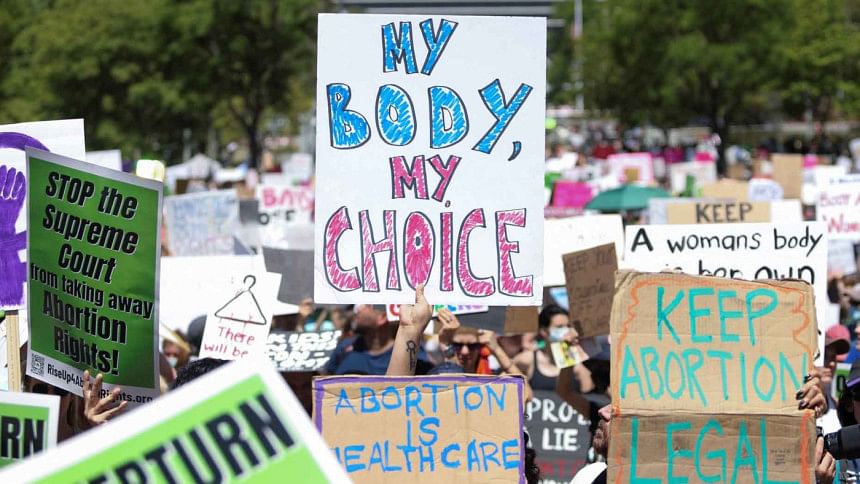Potential Overturning of Roe vs Wade: Let women have agency over their own bodies

A leaked draft opinion shows that the US Supreme Court is set to overturn Roe vs Wade and Planned Parenthood vs Casey, two Supreme Court decisions that guarantee the federal constitutional protection of the right to abortion. The striking of Roe vs Wade would be the final blow to abortion rights in the US, following several recent state legislations against abortion, including regulation of the stages of pregnancy at which abortion is legal. If Roe vs Wade is overturned, we are likely to see an overhaul of most reproductive rights of American women, resulting in state control, surveillance, and criminalisation of women's bodies.
But the effect of the law will not be the same everywhere. The language of the draft opinion is very deliberate that the court will be returning the power of abortion legislation to elected representatives in the states. The fate of women's access to abortions will be dependent on the political affiliation of their state. If the 1973 decision in Roe vs Wade is overturned, abortion will likely become illegal in at least 26 states, leaving abortion legal in the coastal blue states. As in the days before Roe vs Wade, the removal of the constitutional right to abortion will have a disproportionate effect on the young, on poor women, and on women of colour. Wealthy women will still be able to travel to safe places for abortion.
US Supreme Court Associate Justice Samuel Alito's draft opinion and recent court battles rely on the personhood of a foetus to bring charges against pregnant women for ending their pregnancies before birth, thus stripping their civil rights. Law professor Michele Goodwin pointed out on Democracy Now that black and brown women were already being criminalised for terminated pregnancies. Pregnant women have been charged with crimes of attempted feticide, manslaughter, or endangerment of a foetus when their pregnancies ended after falling down the stairs or in a shooting.
If the Supreme Court overturns Roe vs Wade, we are likely to see an intensification of the efforts to strip abortion rights that are already present in several anti-abortion bills. Alito's opinion cites the Mississippi bill, which aims to make abortion illegal after 15 weeks of pregnancy. In 2021, the Supreme Court upheld an anti-abortion law in Texas banning all abortions after six weeks of pregnancy. In 2022 alone, 82 new abortion restrictions were introduced in 30 states.
The language in the leaked opinion hints at the attempt to use pregnant women's bodies as sources of supply of infants, by pressuring women towards adoption through illusive claims of safe child welfare programmes that profit off taking away children for adoption. This language to move from abortion to adoption proposes that young mothers carry a pregnancy to term and then give up their babies for adoption. Trump judge Amy Coney Barrett suggested that abortion is unnecessary since mothers can use the safe haven law to safely give up their babies. Activist Rebecca Nagle tweeted that crisis pregnancy centres often act as decoy centres to persuade women through deception and coercion to give up their babies for adoption instead. Soon, anti-abortion states will dictate that a pregnant woman should carry her pregnancy to term. Aside from the loss of freedom, the dictate to carry a pregnancy to term will put young women at dangerous psychological and physical risks, especially in communities with high maternal morbidity.
Some activists are saying that many women in the US have never had real access to abortion. Abortion is already restricted at the federal, state, and local levels. Almost immediately after Roe vs Wade passed, abortion rights were regulated out of existence for poor women when the Hyde Amendment passed by Congress in 1976 (and in effect since 1980) blocked federal funds from being used for abortion—specifically Medicaid-funded abortion. Writer Yasmin Nair writes, "Abortion rights were watered down long ago. Restrictions on access to abortion clinics can be incredibly onerous, requiring some women to make long trips, return for second visits, or observe waiting periods of up to 72 hours." Even the draft opinion concedes that state legislation in some states has always tightly restricted abortion at all stages of pregnancy.
Democrats now control the House and the Senate, but they don't have the 60 votes necessary to codify abortion rights into law (Democrats only have 50 senators). The filibuster is a Senate rule that requires 60 votes to pass most legislation. Democrats could end the filibuster with 50 votes, but two Democratic senators, Joe Manchin and Kyrsten Sinema, may not vote to end the filibuster. Meanwhile, powerful democrats like Nancy Pelosi and Jim Clyburn have endorsed anti-abortion Democrat Representative Henry Cuellar against the progressive pro-choice candidate Jessica Cisneros in an important primary election in Texas.
Abortion has always been marginalised on all sides of the political spectrum. In his presidential campaign, President Barack Obama promised to codify Roe vs Wade into law, but he did not do so during his term when Democrats held a filibuster-proof 60-40 supermajority in the Senate, saying it was not his highest legislative priority and that abortion was a divisive issue. Instead, he focused on reducing teen pregnancy. In 2016, presidential candidate Hillary Clinton chose the anti-abortion Tim Kaine as her running mate. And President Joe Biden voted against Medicaid funding for abortion in 1977, voted against federal workers using health insurance on abortion in 1983, and openly opposed abortion many times as a devout Roman Catholic.
Many young people are saying that no matter how many times you vote or seek to reform through elections, people's choices will never be reflected. How can we seek reform through the Supreme Court, when the court has itself imposed cruel rules? The leaked opinion argues that the court can only make a decision based on the rights already protected by the constitution and historical precedent, but America is a country with a deeply troubled, racist past still codified in law.
Black, brown, and poor women, whose reproductive rights will be most affected by an overturn of the decision in Roe vs Wade, are already denied access to abortion and other reproductive rights. Black women not only have an extraordinarily high maternal mortality rate, but also suffer from systemic racism, lack of safe water, food and shelter, incarceration, and police violence. Indigenous women are routinely abducted, raped, and murdered. Women in Appalachia suffer from horrific reproductive health outcomes and high environmental pollution, from fracking, water and air pollution, and earthquakes. Many women don't even have access to healthcare. In a country with so little regard for the reproductive rights of its black, brown, and poor women, the overturning of Roe vs Wade would only be the final strike against women's freedom, dignity, and well-being.
Gemini Wahhaj is an associate professor of English at Lone Star College in Texas, US.

 For all latest news, follow The Daily Star's Google News channel.
For all latest news, follow The Daily Star's Google News channel. 



Comments